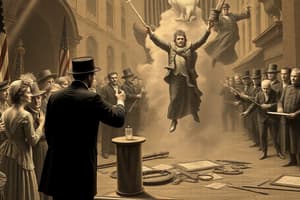Podcast
Questions and Answers
What were the societal impacts of political corruption during the Gilded Age?
What were the societal impacts of political corruption during the Gilded Age?
The societal impacts of political corruption during the Gilded Age included eroding public trust in government, undermining democratic processes, and exacerbating wealth inequality.
What were some examples of prominent political corruption during the Gilded Age?
What were some examples of prominent political corruption during the Gilded Age?
The examples of prominent political corruption during the Gilded Age include the Credit Mobilier Scandal (1867-1868), Boss Tweed, and Jim Fisk.
Gilded Age Corruption: Explain prominent political corruption during the Gilded Age and its societal impact. Highlight Credit Mobilier Scandal (1867-1868), Boss Tweed, and Jim Fisk. Discuss actions taken to address corruption. Economic Challenges: Describe economic difficulties, including Panic of 1873 and capitalist expansion. Explore effects on businesses and institutions like Freedmen's Savings and Trust Company. Elections and Parties: Analyze Gilded Age elections, e.g., Grant in 1868. Compare Republican and Democratic party platforms on Reconstruction. Mention the Liberal Republican Party's influence.
Gilded Age Corruption: Explain prominent political corruption during the Gilded Age and its societal impact. Highlight Credit Mobilier Scandal (1867-1868), Boss Tweed, and Jim Fisk. Discuss actions taken to address corruption. Economic Challenges: Describe economic difficulties, including Panic of 1873 and capitalist expansion. Explore effects on businesses and institutions like Freedmen's Savings and Trust Company. Elections and Parties: Analyze Gilded Age elections, e.g., Grant in 1868. Compare Republican and Democratic party platforms on Reconstruction. Mention the Liberal Republican Party's influence.
Describe the economic difficulties faced during the Gilded Age, including the Panic of 1873 and capitalist expansion.
Describe the economic difficulties faced during the Gilded Age, including the Panic of 1873 and capitalist expansion.
What actions were taken to address corruption during the Gilded Age?
What actions were taken to address corruption during the Gilded Age?
What were the effects of the Panic of 1873 on businesses and institutions like the Freedmen's Savings and Trust Company?
What were the effects of the Panic of 1873 on businesses and institutions like the Freedmen's Savings and Trust Company?
Analyze the Gilded Age elections, specifically Grant in 1868. Compare the Republican and Democratic party platforms on Reconstruction.
Analyze the Gilded Age elections, specifically Grant in 1868. Compare the Republican and Democratic party platforms on Reconstruction.
Explain the societal impact of prominent political corruption during the Gilded Age, with a focus on the Credit Mobilier Scandal (1867-1868), Boss Tweed, and Jim Fisk.
Explain the societal impact of prominent political corruption during the Gilded Age, with a focus on the Credit Mobilier Scandal (1867-1868), Boss Tweed, and Jim Fisk.
What was the influence of the Liberal Republican Party during the Gilded Age?
What was the influence of the Liberal Republican Party during the Gilded Age?
What were the economic difficulties faced during the Gilded Age, including the Panic of 1873 and capitalist expansion?
What were the economic difficulties faced during the Gilded Age, including the Panic of 1873 and capitalist expansion?
How did the Gilded Age elections, particularly Grant in 1868, contribute to the political landscape of the time?
How did the Gilded Age elections, particularly Grant in 1868, contribute to the political landscape of the time?
What were the actions taken to address corruption during the Gilded Age?
What were the actions taken to address corruption during the Gilded Age?
Discuss the effects of the Panic of 1873 on businesses and institutions like the Freedmen's Savings and Trust Company.
Discuss the effects of the Panic of 1873 on businesses and institutions like the Freedmen's Savings and Trust Company.
Flashcards are hidden until you start studying
Study Notes
Gilded Age Corruption and Socio-Economic Impacts
Prominent Political Corruption
- Credit Mobilier Scandal (1867-1868): Union Pacific Railroad company bribed government officials to secure lucrative contracts
- Boss Tweed: notorious politician who bribed officials and embezzled millions in New York City
- Jim Fisk: financier involved in scandals, including the Erie War and a plot to corner the gold market
Societal Impact of Corruption
- Undermined trust in government and institutions
- Perpetuated economic inequality and social injustice
- Fostered a culture of bribery, fraud, and embezzlement
Addressing Corruption
- Reform efforts, including anti-corruption laws and stricter regulations
- Increased public scrutiny and media attention on government corruption
- Rise of reform-minded politicians and activists
Economic Challenges
- Panic of 1873: severe economic downturn caused by speculation and bank failures
- Capitalist expansion: rapid growth of industries, leading to social and economic upheaval
- Effects on businesses and institutions:
- Freedmen's Savings and Trust Company: bank failure due to mismanagement and corruption
Elections and Parties
- 1868 Election: Ulysses S. Grant's presidential win marked by corruption and scandal
- Republican and Democratic Party platforms on Reconstruction:
- Republicans: advocated for civil rights and federal oversight
- Democrats: favored states' rights and limited federal intervention
- Liberal Republican Party influence:
- Criticized corruption and advocated for civil service reform and anti-monopoly laws
Studying That Suits You
Use AI to generate personalized quizzes and flashcards to suit your learning preferences.




